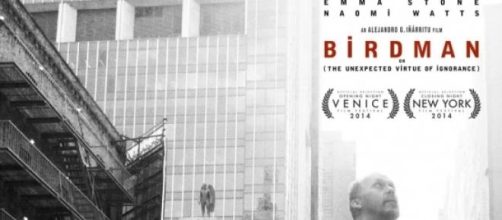The term Postmodernism is used very loosely in criticalcircles. Generally, it is interpreted as a sceptical and cynical look at allaspects of culture, often by highlighting the absurdities and the ridiculousnessof that said culture.
Birdman, (or The Unexpected Virtue Of Ignorance) is a scepticaland cynical look at two very contrasting mediums, the theatre, and Cinema, toldthrough the eyes of Riggan Thomson, as portrayed by Michael Keaton. Thomson iswhat we sensitively refer to as “washed up”, his best days are simply behindhim. Once famous for portraying the screen icon “Birdman”, he is not trying tocarve a name for himself as a serious playwright and actor, by scripting,directing and appearing in an adaptation of Raymond Carvers “What We Talk AboutWhen We Talk About Love”.
Along the way, he encounters neurotic attorneys,psychotic method actors, his apathetic, cynical daughter, and an all too familiarvoice from the past.
Everyone has commented on the Postmodern casting of Keaton.Postmodern in the sense that Keaton of course portrayed Batman in 1989 and1992, and has never really been a big star since. Granted, he hasn't been outof work either, and I'm not suggesting Thomson is based on Keaton as a person,but someone in the casting department must have been aware of the synergycreated here. It’s an example of the films irreverent, cheeky style. Incidentally,Ed Norton portrays an actor who is notoriously difficult to work with, andinsistent on everything being JUST right and “real”.
Synergy.
Every scene is beautiful. I don’t use that word lightly,this is a BEAUTIFUL Film. It glides through every moment, literally and figuratively,with a grace that simply doesn't exist in enough mainstream movies. I say literally,because the film is edited to appear to take place in mostly one take. Thereare virtually no cuts; everything appears to unfold in “real time”, even whendays and hours pass in the story.
You’ll see what I mean. Postmodernism drawsour attention to what we’re watching. We’re watching a movie about a play,staged as if it were a play. No fourth walls are broken, but you feel like the charactersmay have one eye on it at all times. This isn't to imply the film is smug, ortrying to prove its own cleverness, it just means it’s confident, and doesn'tcare who knows it.
Every performance is sublime. Keaton reminds us howbrilliant he can be at carrying a whole movie. It’s all in the eyes. Thosebitter, pained, weary eyes. Often, a scene with no dialogue will say so muchmore about the character then any of the chatty moments. Norton gets to be thedarkly comic relief, and excels. Emma Stone sells what could have been a deeplyunlikeable character, by bringing the sarcasm and cynicism from a dark, scaredplace. You can all too often hear the scared little girl behind the apatheticteenager.
The delightfully unorthodox jazz drum score that punctuates every moment, as if someone is constantly banging on all the characters minds, is also a touch of pure class.
Don’t wait for the DVD/Blu Ray or Netflix release; go seethis on the big screen right now.
Stop reading this. Stop reading right in themiddle of this sentence your reading now, get out of your house and go see thisat the nearest cinema. This is an experience designed to be seen in a big dark,intimate experience. If Birdman isn't on my list of best films of 2015 by theend of the year, I’ll be really quite shocked.

